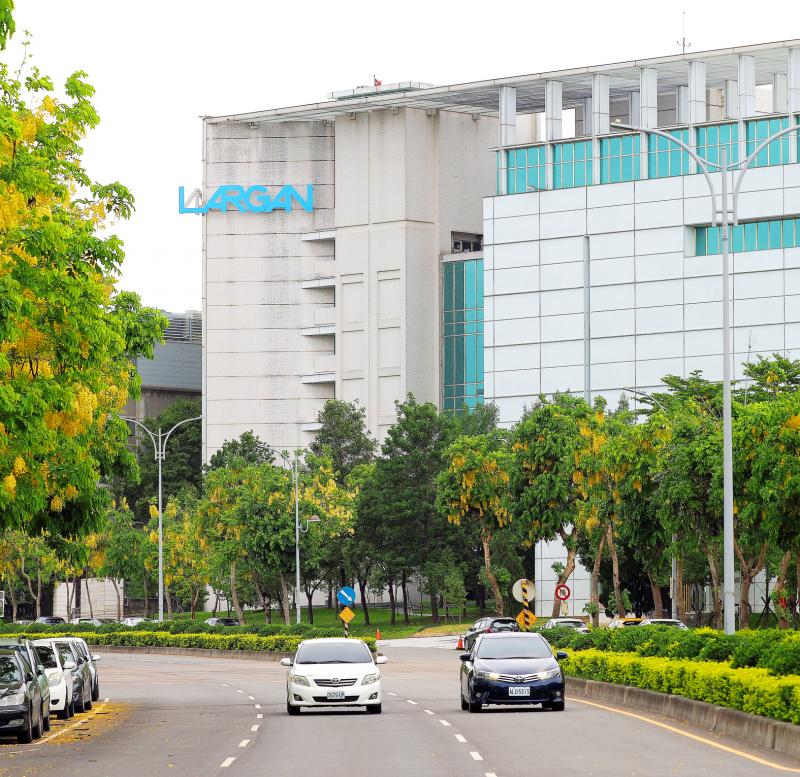Hon Hai Precision Industry Co (鴻海精密), the world’s largest contract electronics maker, yesterday reported the highest revenue for October in its history as it ramped up production for major clients.
That included Apple Inc’s Oct. 13 launch of the iPhone 12 and iPhone 12 Pro.
Hon Hai, which is known as Foxconn Technology Group (富士康科技集團) internationally, is the largest assembler of iPhones.

Photo: DAVID CHANG / EPA-EFE
Consolidated revenue was NT$612.55 billion (US$21.21 billion) last month, up 31.4 percent month-on-month and 2.8 percent year-on-year, Hon Hai said in a statement.
That was the third-highest monthly result for the company.
A sales breakdown showed that consumer electronics made the largest contribution to revenue last month, the company said.

Photo: David Chang, EPA-EFE
That was followed, in order, by cloud and Internet products, components, and computer peripherals, it said.
In the first 10 months of this year, revenue totaled NT$3,960.9 billion, down 5.6 percent from same period last year, company data showed.
Hon Hai announced that it plans to be “carbon emissions neutral before 2050” in its support of the Paris Agreement on climate change.
“In accordance with the three main goals of the Climate Action 100+ benchmark, we pledge to improve climate change management, reduce emissions for the Hon Hai value chain and practice information transparency,” the company said in a separate statement.
The benchmark is an investor initiative to push the world’s largest corporate greenhouse gas emitters to take action on climate change.
More than 400 companies participate in the initiative, including Ford Motor Co and Airbus SE.
Separately, Largan Precision Co (大立光), the nation’s leading manufacturer of handset camera lenses, reported revenue for last month rose 0.3 percent to NT$5.14 billion from September.
However, the figure fell 22.3 percent year-on-year, it said.
A breakdown of shipments provided by the company showed that 10-megapixel lenses accounted for 50 to 60 percent of overall shipments, 20-megapixel and higher-resolution lenses made up 10 to 20 percent, and those with a resolution of 8 megapixels contributed about 10 percent.
From January to last month, Largan’s combined revenue was NT$45.79 billion, a 7 percent decline from NT$49 billion in the same period last year, it said.

Semiconductor shares in China surged yesterday after Reuters reported the US had ordered chipmaking giant Taiwan Semiconductor Manufacturing Co (TSMC, 台積電) to halt shipments of advanced chips to Chinese customers, which investors believe could accelerate Beijing’s self-reliance efforts. TSMC yesterday started to suspend shipments of certain sophisticated chips to some Chinese clients after receiving a letter from the US Department of Commerce imposing export restrictions on those products, Reuters reported on Sunday, citing an unnamed source. The US imposed export restrictions on TSMC’s 7-nanometer or more advanced designs, Reuters reported. Investors figured that would encourage authorities to support China’s industry and bought shares

TECH WAR CONTINUES: The suspension of TSMC AI chips and GPUs would be a heavy blow to China’s chip designers and would affect its competitive edge Taiwan Semiconductor Manufacturing Co (TSMC, 台積電), the world’s biggest contract chipmaker, is reportedly to halt supply of artificial intelligence (AI) chips and graphics processing units (GPUs) made on 7-nanometer or more advanced process technologies from next week in order to comply with US Department of Commerce rules. TSMC has sent e-mails to its Chinese AI customers, informing them about the suspension starting on Monday, Chinese online news outlet Ijiwei.com (愛集微) reported yesterday. The US Department of Commerce has not formally unveiled further semiconductor measures against China yet. “TSMC does not comment on market rumors. TSMC is a law-abiding company and we are

FLEXIBLE: Taiwan can develop its own ground station equipment, and has highly competitive manufacturers and suppliers with diversified production, the MOEA said The Ministry of Economic Affairs (MOEA) yesterday disputed reports that suppliers to US-based Space Exploration Technologies Corp (SpaceX) had been asked to move production out of Taiwan. Reuters had reported on Tuesday last week that Elon Musk-owned SpaceX had asked their manufacturers to produce outside of Taiwan given geopolitical risks and that at least one Taiwanese supplier had been pushed to relocate production to Vietnam. SpaceX’s requests place a renewed focus on the contentious relationship Musk has had with Taiwan, especially after he said last year that Taiwan is an “integral part” of China, sparking sharp criticism from Taiwanese authorities. The ministry said

US President Joe Biden’s administration is racing to complete CHIPS and Science Act agreements with companies such as Intel Corp and Samsung Electronics Co, aiming to shore up one of its signature initiatives before US president-elect Donald Trump enters the White House. The US Department of Commerce has allocated more than 90 percent of the US$39 billion in grants under the act, a landmark law enacted in 2022 designed to rebuild the domestic chip industry. However, the agency has only announced one binding agreement so far. The next two months would prove critical for more than 20 companies still in the process